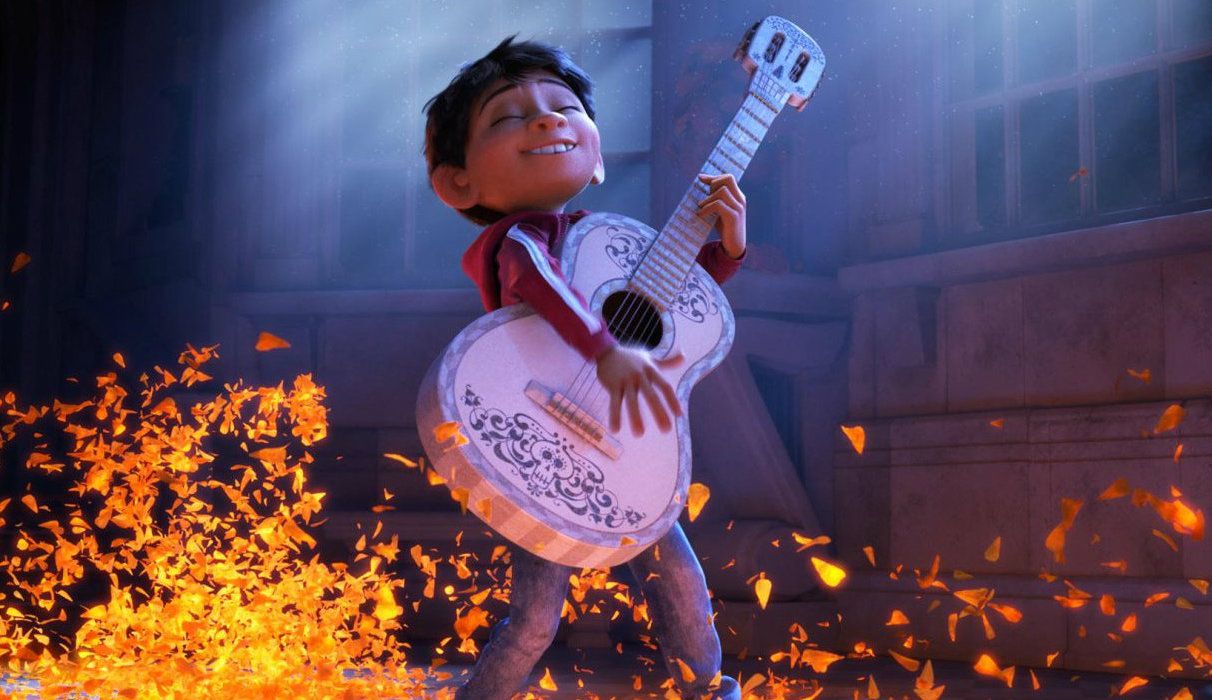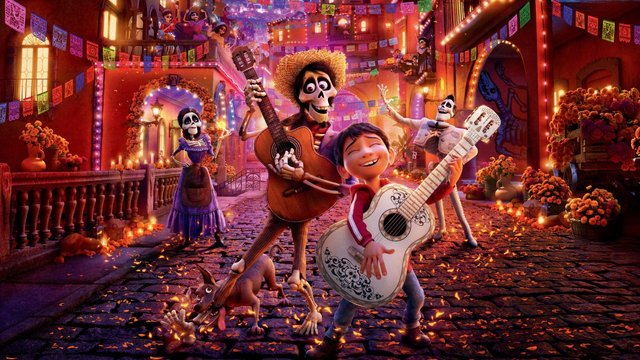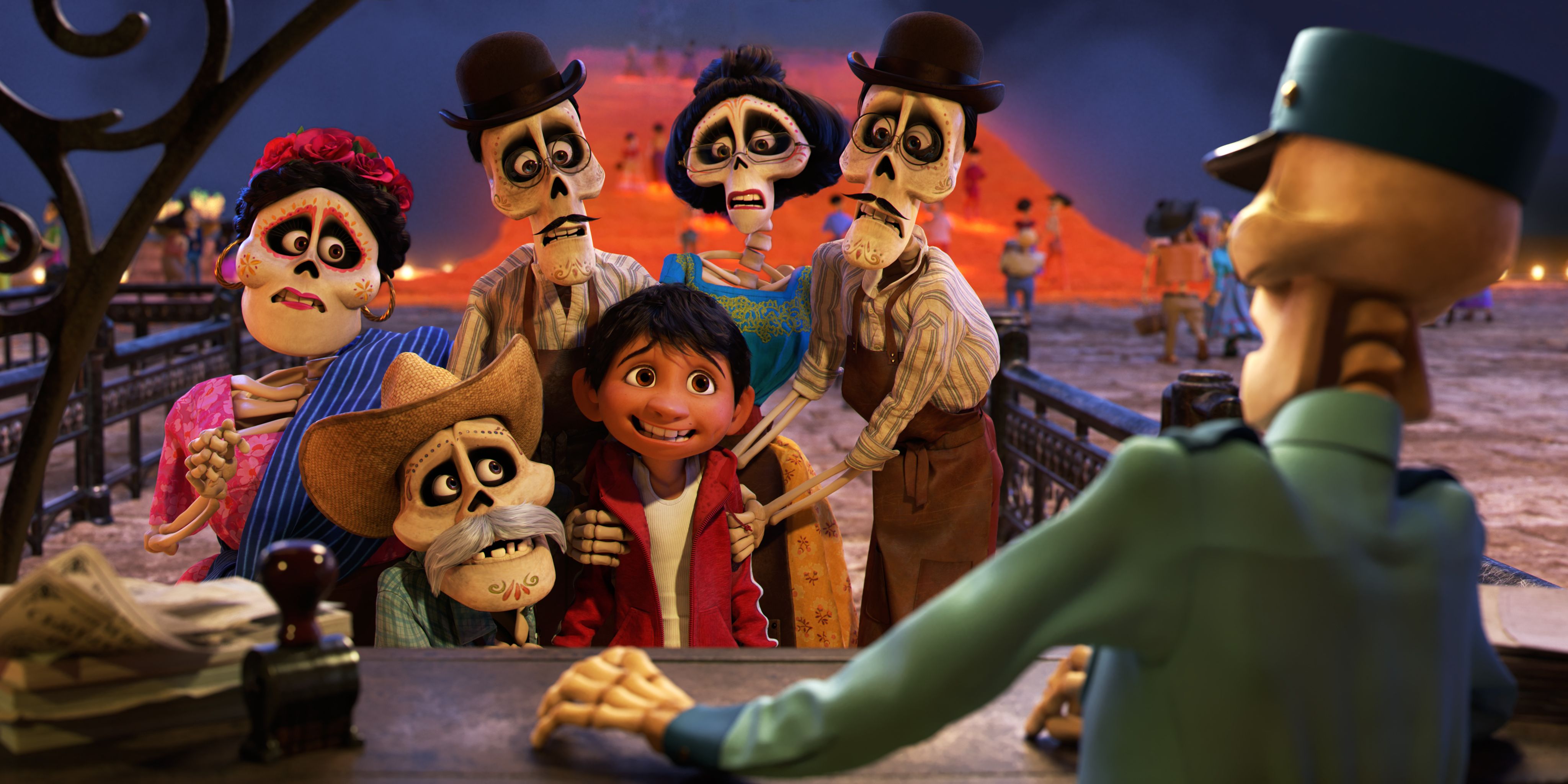Film Review: Coco

Coco is an upsetting work of beautiful creativity.
Set in modern-day Mexico, it tells the story of a young boy called Miguel who wants to be a musician, but is BANNED by his family on account of them not liking music. They are directly responsible for his subsequent transportation to the Land of the Dead, an exquisite realisation that forms the backdrop to Miguel’s character arc.
Miguel has to enlist the help of his dead family (who are skeletons) to return to the living world. This involves action, japes and a mysterious, dead musical idol.
It also involves child abuse on an epic scale.
Praise
I have no interest in completely poo-pooing Coco. My god, the technology and artistry that Pixar has cultivated in the 22 years since Toy Story is spellbinding. Preceding the feature was a short behind-the-scenes look at just one of the stunning vistas created by the team. As Arthur C. Clarke once noted: “Any sufficiently advanced technology is indistinguishable from magic.” Coco is a great example of that.Huge credit must also be given to the faithful, respectful representation of the Mexican festival Dia De Los Muertos (the Day of the Dead). As an Uber driver, I was lucky enough to discuss this at length with a charming Mexican passenger called Ricardo, only yesterday. I have had some long trips and many engaging riders, but it’s rare to have both of these together.
Ricardo told me that Coco is revered in Mexico for its accurate depiction of Dia De Los Muertos. He also told me something special: the festival is vigorously opposed by the Catholic church due its reliance on altars to figures other than Jesus/God/Holy Ghost. Given that Mexico is a deeply Catholic country, many citizens—particularly in the more religious rural areas—struggle to rationalise this belief system. But Dia De Los Muertos is an unshakeable tradition, and it sustains.
Hearing this from Ricardo, I became conscious that I had indeed questioned that religious paradox while watching Coco. I had quickly dismissed it to focus on the narrative, but I now appreciated the festival with a fresh brain. What a lovely thing, I thought. Keeping loved ones’ memories alive by celebrating them every year. Effectively breaking bread with lost companions.
This, however, is where the narrative began to crack.

Criticism
Remembering loved ones is great. But how about remembering ‘loved ones’—ones that we are commanded to love?Traditional families often stifle and abuse their children, conditioning them to conform to irrational societal norms. Chief among these is respecting your elders.
Coco appears to want to reconcile the story of a boy whose autonomy is crushed by his family. A boy who is bullied and disrespected. The correct conclusion to this storyline is for them to realise Miguel’s inherent value as a human being. Devastatingly, this never happens. Or, more accurately, it happens only on their terms.
A great story, in my opinion, is one where there is a broken sense of normality, then issues are raised, then those issues are tied off, or in some way explored for the advancement of joy or enlightenment. While many of Coco’s subplots are neatly resolved (as is acceptable in a mainstream children’s film), the central plot is smeared around the digital canvas with unforgivable disdain.
Without giving too much away, in act one Miguel is abused in the most spirit-crushing way—something that is never truly atoned for. Miguel’s inherent value is never respected by his living family. His value is only respected in the context of how he manages the emotions of his elders. And that, my dear readers, is abuse.

Conclusion
When I presented this data to Ricardo, he agreed that I had seen a dark heart to Coco he had overlooked. For all the beautiful goodness the film captures, the most important message is thrown away like a piece of old rubbish. The ostensible happy ending was not so happy to me.In even more basic terms, I only watched Coco because my friend wanted to. He sent me the trailer, which I found underwhelming and boring. Maybe the film’s true heart was more subversive than the trailer suggested. It was not. It was exactly as I had expected.
A couple of years ago, Pixar made one of the best, most insightful, most paradigm-shifting films of the decade: Inside Out. For some reason they have regressed. Coco is aesthetically and philosophically beautiful, but morally bankrupt. It’s an insult to the concept that family is meant to love unconditionally.
In the words of Massive Attack: “Love, love is verb. Love is a doing word.” Let’s try to remember this.
Thanks for reading.
An opus of critique.
You raise some very significant points about the (im)moral of the story: Don't be independent.
Perhaps a good companion study to Coco is the movie Family Life (Loach, 1971), which also depicts a vulnerable, creative child, being rendered subservient by a family system locked into trauma repetition.
I also double-down on my suspicions that Coco was an allegory for the ousting of John-I-demand-a-hug-Lasseter from Pixar. The character of Ernesto de la Cruz seems to bear one pixel too many in common with the disgraced Lasseter.
In this reading of the film: Coco's repression is the stifled creativity of the Pixar animation studio team; Coco's family is entrenched managerial structures; and Ernesto de la Cruz is Lasseter himself — the patriarchal figurehead they never needed: Deceitful and entitled.
Coco then, for all its faults, is both exorcism and artwork. A metaphorical sage, its smoke billowing about the corridors of Pixar, clearing the air for a new epoch of consensual hugs. I also look forward to the much-improved storytelling that will be possible at Pixar, now the animators don't feel under threat of casual molestation by the obligatory office-patriarch.
Pixar have had their Dia De Los Muertos.
Now they must rise again and "get the job done".
Thank you for that compliment.
Family Life is certainly a good reference work, yes.
I feel hopeful that they have already broken out of their Lassetercuffs and will produce another ★★★★★ film presently.
🙏🏼
thanks so much @lenskonig very interesting review loved your conclusion on it
You’re welcome and thanks 🙏🏼
I wrote what I felt — easiest review I’ve ever written to be honest.
loved your review style man nice time i had reading this
Glad to hear it. Many thanks 🙏🏼
Looks and sounds quite interesting to me would watch it once for sure thanks for your amazing review
You’re welcome 🙏🏼
Not seen it till now if my friend will watch i too will watch hahah :)
I watched Coco about a month ago with my wife and 5-year-old daughter and I liked it a lot. But it doesn't feel like a kids movie. Nor is it really funny, I remember laughing once or twice at best.
But it is almost mechanically engineered to pull your heartstrings, by using the traditional plot mechanics: poor rejected hero has to overcome obstacles to fulfill his wishes, no one believes in him, good guy is bad guy after all, everyone is happy in the end, despite their unshakeable beliefs until then.
Your review touches a point that I also found a bit irksome - why would Miguel's family so strongly oppose his desire to be a musician based on life "facts" from a long dead relative? Why force a kid to live a boring work life and give up on his dreams, when he clearly had the talent?
Love family unconditionally? Never. Love the ones who love you back, family or not, that would be the right message.
However, I can't fully criticize Pixar on this, because we all know families like these exist, especially under certain poverty conditions. Kids are bullied, used, dreams killed, forced to obey their parents and grandparents, no hope. It's stupid, it's tragic, but it happens. Just look at those countries where kids are forced to work all day in factories for the wealthy countries to have their clothes, their toys, their... iPhones.
Pixar chose that route for Coco, as a movie about a kid who is supported by his family to follow his dreams would probably be over in 30 minutes.
Coco falters especially when everyone suddenly supports Miguel when they clearly were against his passion. This sounds like a cop-out, like everyone suddenly tuned into the same mindset as machines. No amount of dead musicians who allegedly abandoned their families should force anyone to forbid a kid from following his dream.
It’s weird that I said, “an insult to the concept that families should love unconditionally,” because I do agree it has to be a two-way stream. More accurately it should maybe be the parents who love their children unconditionally because they are the ones with the power, at least for the first couple of decades.
There are many families as depicted in Coco. What I would have liked to have seen was them apologise to Miguel for not giving him freedom before. Again, it all hinged on what he could provide for his elders, not giving him autonomy because of basic human rights. They could have fixed this with a few lines at the end but chose not to. Maybe it is implied... but I don’t think so...
Thank you for your thoughts. They have made me think.
I agree. The plot works fine as a Pixar movie but a few lines at the end could have made the transition smoother and easier to digest. Or maybe a few of Miguel's family (there were so many) could actually be very supportive of his passion from the beginning, but he was pretty much alone in his challenge.
Parents should support their kids' dreams, if these dreams are logical. In Coco, it's a fact that Miguel's parents looked more like passive characters than anything else. A bit of support would go a long way.
Thank you for your interpretation of this movie, it made me think a bit about the power of a family, and as my role in being a father of a 5-year-old who dreams of becoming a different thing almost every day :)